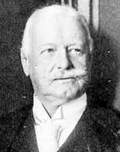The son of a state secretary for foreign affairs under Otto von Bismarck, Bernhard von Bülow studied law in Lausanne, Berlin, and Leipzig. He participated in the French-Prussian war (1870-1871) as volunteer. After admission into the German foreign service, Bülow served as diplomat in Italy, Russia, Austria-Hungary, Greece and France (1874-1888). In 1888-1893 he was promoted to the envoy to Romania; in 1893-1897 served as German Ambassador in Rome. Bülow returned to Berlin to assume the office of state secretary for foreign affairs of the German Reich (1897-1900). In this capacity, he carried out aggressive foreign policy aimed at acquiring new colonies and navy rearmament. In 1899, Bülow was made Graf (count) and became a real political force behind the Reich Chancellor Chlodwig Fürst zu Hohenlohe-Schillingsfürst. As state secretary, he scored some gains in the Pacific, acquiring Chiao-chou (Kiaochow) Bay, China; the Caroline Islands; and Samoa. In 1900 Bülow replaced Hohenlohe-Schillingsfürst as Reich Chancellor and president of the Prussian state ministry. He relied on the support of the Conservative Party and the Catholic Centre Party. Some moderate social legislation was developed under the influence of the secretary of state for the interior, Arthur Graf von Posadowsky-Wehner. The government of Bülow evaded some domestic problems, but was active in foreign policy. The confrontation with France and Britain over Morocco (1905-06) increased international tension. In 1907 Bülow dissolved the Reichstag after the conflict with the Centre Party. In the new Reichstag he relied on the bloc of the Conservatives, National Liberals and Left Liberals (Bülow-Block). In 1908, Bülow's relationship with the Emperor Wilhelm II suffered from the Daily Telegraph Affair. After the Bülow-Block failed to reach an agreement on finance reform, Bülow resigned the chancellorship on 14 Jul 1909. In 1914-1915 Bülow was a special envoy in Rome, where he was trying to prevent the entrance of Italy in World War I on the side of the Entente. After the resignation of Theobald von Bethmann Hollweg, Bülow was a candidate to new Reich Chancellor, but Wilhelm II objected his candidature. Biography source: [2] |

